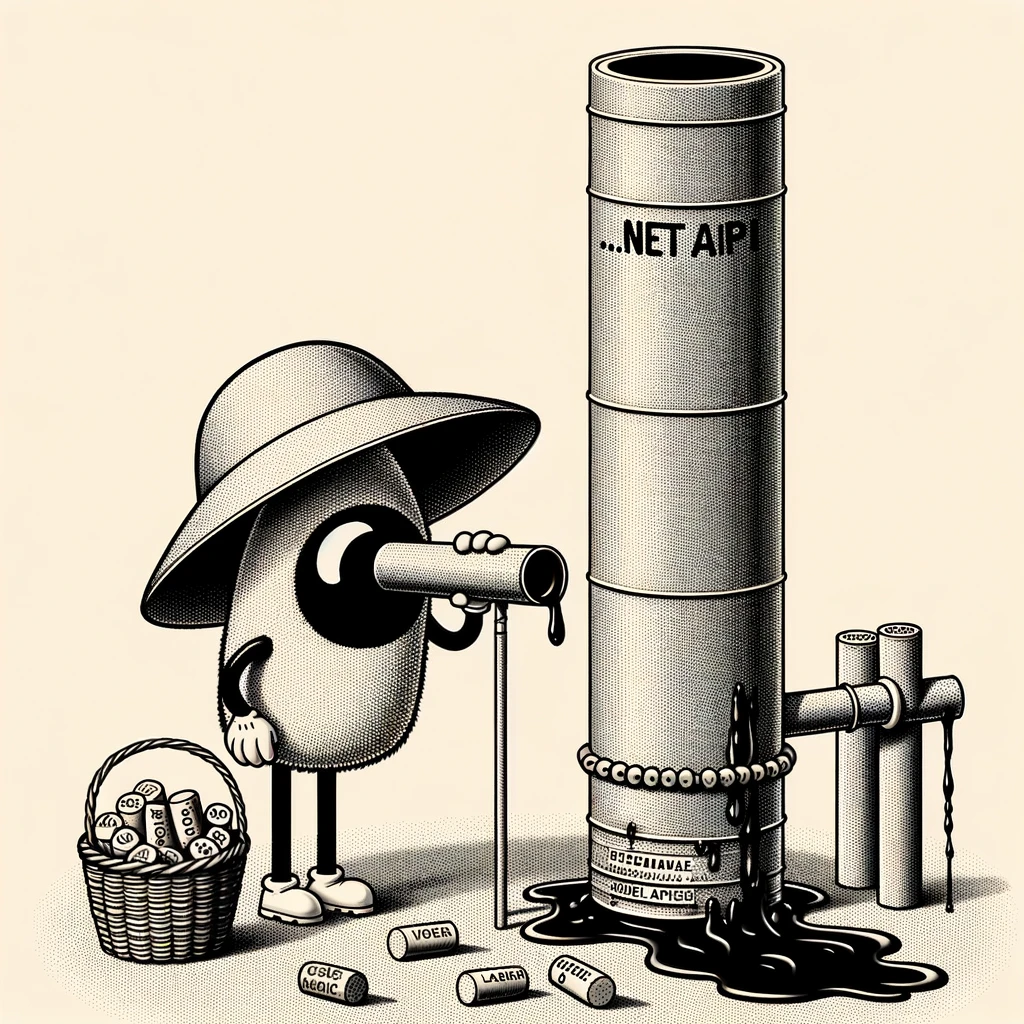Vinz
Debugging an Api pipeline
 Մι∩z•thedev · Follow
Published in Coding · 6 min read · 1 day ago
__
👏65k 💬321 🔖 ⤴️
__
Մι∩z•thedev · Follow
Published in Coding · 6 min read · 1 day ago
__
👏65k 💬321 🔖 ⤴️
__

It is somehow tricky to turn on a probe to inspect the request processing pipeline. Ideally you’d like to capture the request body at the very beginning, and the response body at the very end of the processing. That way you can assess if the frames comply to your expectation.
I propose a MyDebugMiddleware to be registered as early as possible. Here is an implementation extract that will certainly help many. I myself found the plugging into the streams a bit confusing. Of course this shall not be used in production because there is not efficient buffering or whatsoever addressed. Nonetheless is proves to be salvatory during dev/debug to spot mishaps in the RPC communication.
/*
* Copyright (C) 2024 Vincent Fontaine
*
* This program is free software: you can redistribute it and/or modify
* it under the terms of the GNU General Public License as published by
* the Free Software Foundation, either version 3 of the License, or
* (at your option) any later version.
*
* This program is distributed in the hope that it will be useful,
* but WITHOUT ANY WARRANTY; without even the implied warranty of
* MERCHANTABILITY or FITNESS FOR A PARTICULAR PURPOSE. See the
* GNU General Public License for more details.
*
* You should have received a copy of the GNU General Public License
* along with this program. If not, see <http://www.gnu.org/licenses/>.
*/
public class MyDebugMiddleware
(
RequestDelegate next,
/*...shortened...*/
)
{
/*...shortened...*/
private static int RequestId = 0;
public async Task Invoke(HttpContext context)
{
var rid = RequestId++;
var tid = context.Request.HttpContext.TraceIdentifier;
var t0 = DateTime.Now;
string? requestBody = null;
string? responseBody = null;
try
{
//read the request body stream (--> capture request body)
MemoryStream? requestBodyMemoryStream;
if (context.Request.Body.CanRead)
{
requestBody = await new StreamReader(context.Request.Body).ReadToEndAsync();
//and rewrite body it into our own rewindable buffered stream that will replace original one.
//ie. original stream would not have allowed being read twice
requestBodyMemoryStream = new MemoryStream();
{
var requestBodyCopy = new StreamWriter(requestBodyMemoryStream, Encoding.UTF8);
await requestBodyCopy.WriteAsync(requestBody);
await requestBodyCopy.FlushAsync();
requestBodyMemoryStream.Seek(0, SeekOrigin.Begin);
}
context.Request.Body = requestBodyMemoryStream;
}
logger.LogInformation(@$"
<<-( Request )--------------------------------/{rid:000000}/
| {context.Request.Scheme.ToUpper()} {context.Request.Method} {context.Request.Path}{context.Request.QueryString}
| ORIGIN {context.Request.Host}
+---/{tid}/--------------------------
{requestBodyObj}
---");
//before next middleware happens, replace the response body stream with our own rewindable buffered stream (--> prepare capture response body)
var originalBodyStream = context.Response.Body;
await using var responseBodyMemoryStream = new MemoryStream();
context.Response.Body = responseBodyMemoryStream;
//let the pipeline complete -or not-
//
await next(context);
//
//
//read the response body stream.
//ie. original write stream would not have allowed being read
responseBodyMemoryStream.Seek(0, SeekOrigin.Begin);
responseBody = await new StreamReader(context.Response.Body, Encoding.UTF8).ReadToEndAsync();
responseBodyMemoryStream.Seek(0, SeekOrigin.Begin);
var dt = (DateTime.Now - t0).TotalMilliseconds;
logger.LogInformation(@$"
+--( Response {$"{dt,6:#####0}"}ms)-----------------------/{rid:000000}/
| {context.Request.Scheme.ToUpper()} {context.Request.Method} {context.Request.Path}{context.Request.QueryString}
| ORIGIN {context.Request.Host}
+---/{tid}/--------------( {context.Response.StatusCode:000} )--->>
{context.Response.ContentType ?? "text"}
{responseBody}
---( Request )
{requestBody}
---");
await responseBodyMemoryStream.CopyToAsync(originalBodyStream);
context.Response.Body = originalBodyStream;
}
catch (OperationCanceledException ex)
{
context.Response.StatusCode = (int)HttpStatusCode.RequestTimeout; //408
var dt = (DateTime.Now - t0).TotalMilliseconds;
logger.LogWarning(@$"
!--( Canceled {dt,6:#####0}ms)-----------------------/{rid:000000}/
| {context.Request.Scheme.ToUpper()} {context.Request.Method} {context.Request.Path}{context.Request.QueryString}
| ORIGIN {context.Request.Host}
!!!!!{tid}!!!!!!!!!!!!!!( {context.Response.StatusCode:000} )!!!!!X
Failure cause by {ex.GetType().Name}:
{ex.Message}
{ex.StackTrace}
---");
}
catch (Exception ex)
{
context.Response.StatusCode = (int)HttpStatusCode.Conflict; //409
if (ex.InnerException != null) ex = ex.InnerException;
var dt = (DateTime.Now - t0).TotalMilliseconds;
logger.LogError(@$"
!--( Aborted {dt,6:#####0}ms)------------------------/{rid:000000}/
| {context.Request.Scheme.ToUpper()} {context.Request.Method} {context.Request.Path}{context.Request.QueryString}
| ORIGIN {context.Request.Host}
!!!!!{tid}!!!!!!!!!!!!!!( {context.Response.StatusCode:000} )!!!!!X
Failure cause by {ex.GetType().Name}:
{ex.Message}
{ex.StackTrace}
---");
}
}
}